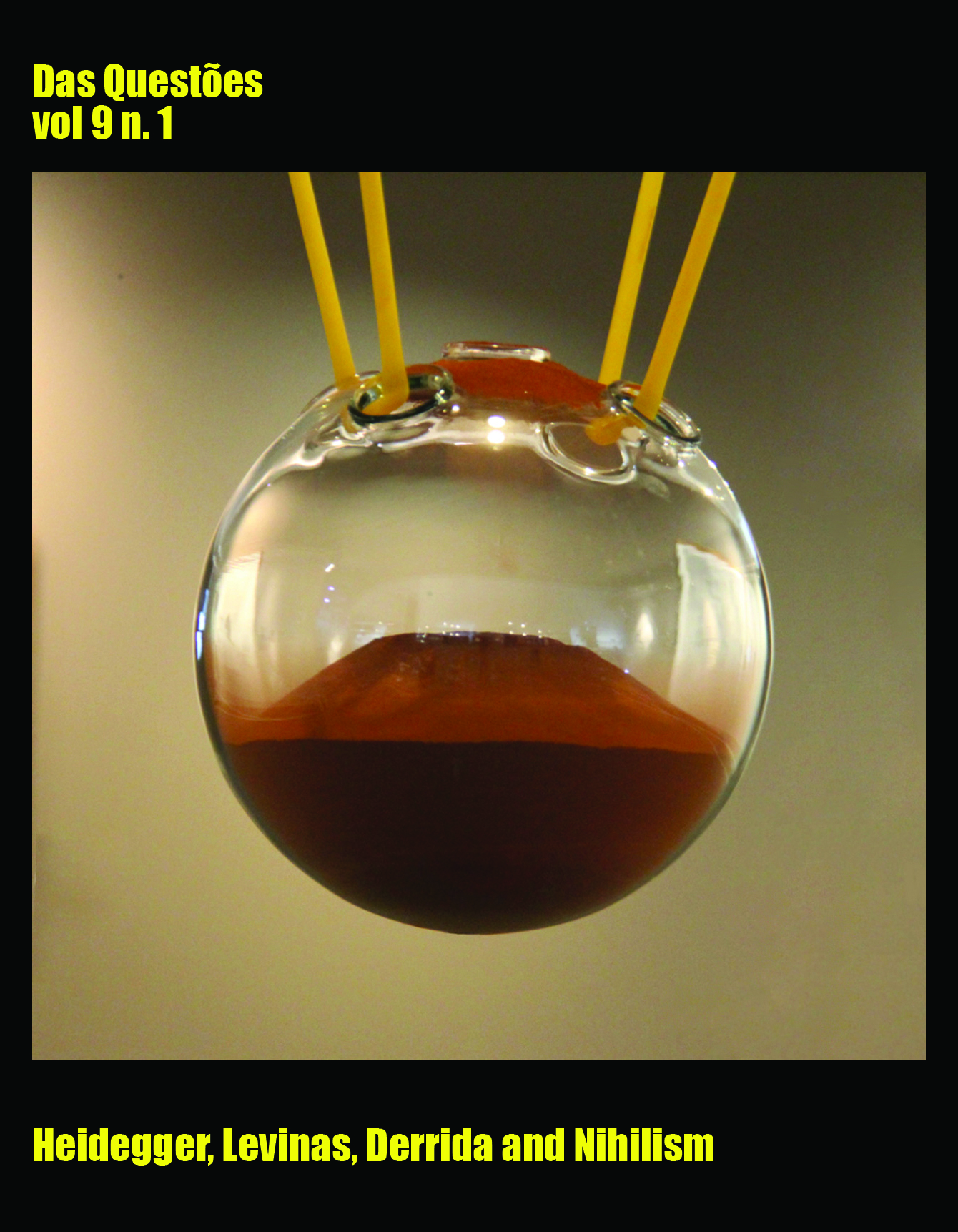History supposes Justice
DOI:
https://doi.org/10.26512/dasquestoes.v9i1.31901Keywords:
Deconstruction, Nihilism, Crisis, Aporia, Apocalypse, Catastrophe, Spectres, Technology, Temporality, History, Truth, JusticeAbstract
This article seeks to firstly demonstrate in which manner the philosophies of history, through the signifiers of crisis and apocalypse, amount to a form of nihilism by persistently surmounting, each in their own manner, the singularity of historical events by integrating and comprehending these in a teleological and eschatological narrative of meaning and truth. In this sense, our attempt is to deploy a novel manner of rethinking our relation to catastrophic historical events where their very singularities engage a historical responsibility which renounces the recourse to the determined logics of crisis and apocalypse in history. Consequently we focus on the spectralityof historical events incessantly returning as occurring singularly to our present, and where each event in history denies its integration in an appeased historical consciousness. This article intends thus to deploy a relation to temporality where the idea of justice provokes a hyperbolical responsibility towards past andfuture deaths and lives in history.
Downloads
References
ANDERS, Hiroshima ist überall. Tagebuch aus Hiroshima und Nagasaki, C. H. Beck, Munich, 1982.
COHEN, J. ZAGURY-ORLY, R. “Heidegger Caught Up. Antijudaism and the Question of Technology Re-examined”, in Cosmopolitism, Heidegger, Wagner ”“ Jewish Reflections (Ed. D. Pedersen), Stockholm, Judisk Kultur i Sverige, 2019,
COHEN, J. ZAGURY-ORLY, R. “Beyond Apocalyptic Logos”, in Heidegger and Jewish Thought. Difficult Others, (Ed. E. Lapidot and M. Brumlik), Lanham (Maryland), Roman & Littlefield, 2017
COHEN, J. ZAGURY-ORLY, R. “Standing at the Limits of the Political”, in Derrida-Levinas. An Alliance Awaiting the Political (Eds. O. Ombrosi and R. Zagury-Orly), Milan, Mimesis International, 2018
Co COHEN, J. ZAGURY-ORLY, R. “Interrupting Apocalyptic Logos. On Nuclear Catastrophe”, in Il Nucleare: Una Questione Scientifica e Filosofica dal 1945 a Oggi ”“ Nuclear Power: A Scientific and Philosophical Issue from 1945 to today, (Ed. O. Ombrosi), Milan, Mimesis International, 2019, pp. 245-262.
DERRIDA, J. “Poetics and Politics of Witnessing”, in Revenge of the Aesthetic: The Place of Literature in Theory Today (Ed. M. P. Clark), Berkeley-Los Angeles-London, University of California Press, 2000
DERRIDA, J. Adieu to Emmanuel Levinas, transl. P.-A. Brault and M. Naas, Stanford, Stanford University Press, 1999, p. 111.
DERRIDA, J. Aporias, trans. T. Dutoit, Stanford, Stanford University Press, 1993
DERRIDA, J. The Gift of Time, trans. P. Kamuf, Chicago, University of Chicago Press
HEGEL, G. The Difference Between the Philosophical Systems of Fichte and Schelling, trans. H. S. Harris and W. Cerf, New York, SUNY Press, 1988.
HEIDEGGER, M. The Bremen and Freiburg Lectures. Insight Into That Which Is and Basic Principles of Thinking, trans. A. J. Mitchell, Bloomington, Indiana University Press, 2012
HEIDEGGER, M. “The Danger”, in The Bremen and Freiburg Lectures. Insight Into That Which Is and Basic Principles of Thinking, op. cit., pp. 44-63.
HEIDEGGER, M. “The Question Concerning Technology”, in Basic Writings, trans. D. F. Krell, San Francisco, Harper Collins Publishers, 1992
LEVINAS, E. “Useless Suffering”, in Entre Nous. Essays on Thinking-of-the-Other, trans. M. B. Smith and B. Harshav, New York, Columbia University Press, 2000.
LEVINAS, E. Totality and Infinity, trans. A. Lingis, Pittsburgh, Duquesne University Press, 1969
Downloads
Published
How to Cite
Issue
Section
License
Authors who publish in this journal agree to the following terms:
Authors maintain the copyright and grant the journal the right of first publication, the work being simultaneously licensed under the Creative Commons Attribution License which allows the sharing of the work with recognition of the authorship of the work and initial publication in this journal.
Authors are authorized to take additional contracts separately, for non-exclusive distribution of the version of the work published in this journal (eg publish in institutional repository or as a book chapter), with acknowledgment of authorship and initial publication in this journal.
Authors are allowed and encouraged to publish and distribute their work online (eg in institutional repositories or on their personal page) at any point before or during the editorial process, as this can generate productive changes as well as increase the impact and the citation of the published work.



